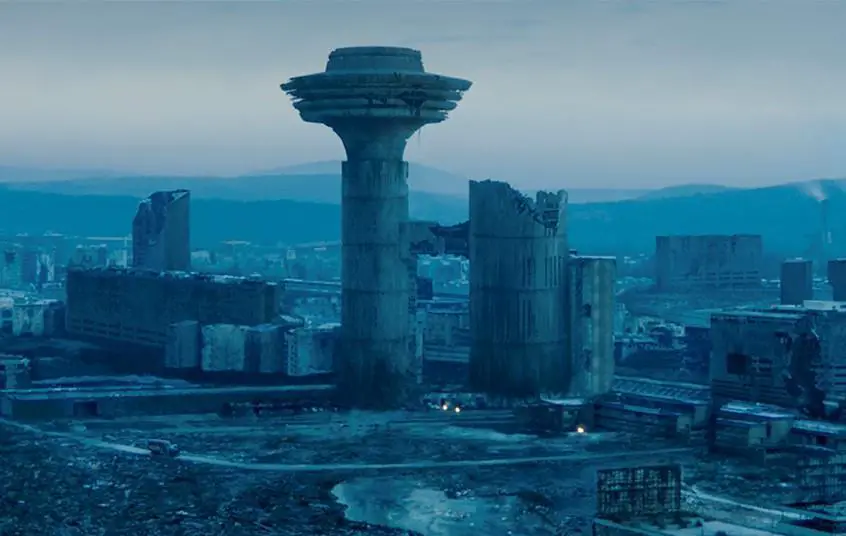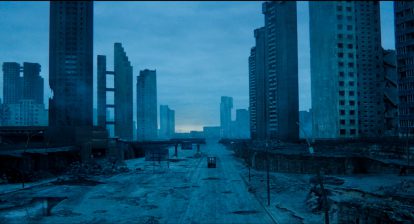With his feature debut, director Chino Moya’s most commanding stroke is the blurring of an otherwise passé dystopic future with the humdrum menace of contemporary alienation. The weaving of the commonplace into the apocalyptic – from dystopian work prisons to office birthday parties – forms a compelling basis for the film’s tactful narrative construction. Connected through something like shades of a sinister magical realism, Undergods links its mischievously intertwined vignettes together so as to make the whole greater than the sum of its parts.
What begins as a bleak and straightforward snapshot into a seemingly distant future – following two slavers as they ferry their cargo through a lonely, ruined landscape – begins to jolt into disparate passages, sometimes as if from entirely different worlds altogether, before taking each in delightfully unexpected directions. Undergods manages in its best passages to blend from landscape to stranger landscape, reality to the distortion thereof. It is neither a science fiction film nor a contemporary arthouse portrait of middle-class malaise, yet it possesses elements of both.
The film really hits its stride with a segment initiated as a bedtime story told to a small girl by her father. Even once she falls asleep, and the father naturally abandons his telling of the tale, the story forges onward for the film’s audience. In the understated neo-noir yarn the two central players, themselves also a father and daughter pairing, are brought to life by delightfully confident performances. Tanya Reynolds’s eyes and accompanying brows accomplish more than some streaming service’s entire libraries – her character’s obvious intellect and humanity held within reach of danger by some of their most integral elements: her noble naivete, her curiosity. And Eric Godon balances a sophisticated cool with underlying shades of icy, indeterminate rage.
Just when the film threatens to teeter into a Saragossoan set of nesting dolls, it instead twists itself around into the realms of inadvertent interconnectedness. By the film’s conclusion – one achieved by a series of escalating scenes stretched between tautness and delirium – Undergods finds itself narratively far more contained than it initially appeared.
The film cannot boast of an incredibly elegant or striking visual sense, but it can commend itself for owning a degree of grace and restraint that cannot by any means be taken for granted. Similarly, the film’s use of music – mostly licensed tracks – manages to buck the exhausting trend of retro-fetishist synthesizer scores that have become like a pernicious blight over the past decade or so. Ironically, the film’s selection of sourced tracks feels fresher than most original scores commissioned in this style. Their sonic identities are inspired – whether they are library music, dance tracks, or ominous ambience – rather than resulting from the pigeonholing of contemporary composers into a distinctly dated style, in the process constricting their individual musical strengths and identities.
All throughout the real success of Undergods rests with a series of performances that lend a curiously strangling and convincingly pained humanity to the proceedings. They are strong showings: from Reynolds and Godon, to Johann Myers as one of the drivers of the ominous rig, to Sam Louwyck as a psychologically demolished prisoner escaped to attempt a re-entry to the life he left behind, to Adrian Rawlins as a working stiff who finds himself crumbling amid cuckoldry anxiety. Rawlins, in a climactic scene of a karaoke performance, steers the sequence from the expected banal embarrassment into a tempered feverishness, all with a performance of public emotional outburst convincingly guttural. But in terms of craft, Rawlins performs like a boiling roil never quite overflowing the rim of its pot.
Ultimately, Undergods is an odd piece. As a debut director, Moya has demonstrated an ambition and a knack for creative storytelling that his visual and aesthetic skills could easily grow into. The film rarely curtails to the emotional or narrative demands of so much contemporary film work, most of which is woefully stifled by and chained to normalcy. In a palette – of the dystopic, the nightmarish, the psychologically pained – that should soar unshackled into much stranger and bolder flights, so many films feel somnambulist in their creative vision and aesthetic interests. Even when Moya’s technical execution feels fairly indebted to and in line with that which is growing ever-tired and fatally familiar, he offers a narrative construction – alongside an emotional timbre – that lends Undergods an artistry to properly match its grim pallor.
Undergods will be in select UK cinemas and On Demand from May 17
Wicked Rating: 7/10

